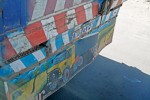Seen in Senegal

Seen in Senegal is a monthly column by Hannah Feig, a recipient of the study-abroad Gillman Scholarship. Feig is studying in the French-speaking African country of Senegal and details her experiences there.
One of the most important things I’ve learned while studying abroad in Senegal is how to appreciate my own culture and my place in the lives of the people I’ve had the opportunity to interact with.
As I walk in an unfamiliar neighborhood, the kids see me and say “tubaab” — which essentially means foreigner, European or white person — and my awareness of my skin color becomes heightened.
This initially made me uncomfortable, but now I understand that it’s not usually an insult, rather traditional ethnic identification. It can start a conversation, and I can surprise them by speaking a little of the native language, Wolof.
On my way to school in the car rapide, I sit among businessmen, students and women wearing beautiful, traditional “boubou” outfits.
I notice the girl across from me is staring at my hair. All the girls in my host family like to play with my hair, and when the wind blows, they giggle.
Yet, I am staring at her beautiful braids that took so much time and effort. I wonder what she thinks of my culture, or if she knows I wish I was more a part of hers.
My host mother and I spend a Sunday evening on N’Gor, an island popular with tourists and locals alike. I sit on the beach, watching the French teenagers to my left and the Senegalese women cooking to my right, and think about how they are so similar in so many tiny, different ways.
I try to comprehend the tourist appeal of N’Gor compared to the beach near my family, where my younger host brothers jump in the water in their underwear and where we buy fresh fish for the next week’s meals.
Another day, I go to the market. I don’t even want to buy anything. I just want to interact with people, and the vendors are more than ecstatic to talk about their lives. We cycle through the Senegalese greetings and presentations in Wolof: Peace be upon you. How are you? How is your family? How has your day been?
They explain their work, desires, families and passions. Our perceptions of life and success are different, yet we are so similar and connected as human beings, with the same needs, goals and essential values.
They have dreams of traveling and visiting the U.S. and Europe, They tell me how education is expensive and that’s why they didn’t continue, but they work so their children can buy books and continue their studies.
They are always smiling and wonder why I am in Senegal, why I want to talk to them and why I am learning Wolof.
I try to give them as much as they give to me, but it’s difficult because they are so ready to share their whole life story.
I go home at night and watch TV with my host family. We flick through channels showing “lutte,” or wrestling, a Wolof drama with a lot of yelling and a slow plot, a Senegalese news station or France 24.
Most often, the television stops on an American show or film dubbed in French — usually one I’ve never heard of and wouldn’t choose to watch back home.
Suddenly, I am faced with my own culture from a Senegalese point of view. The images flick through what I recognize as extremes of drugs, sex, robbery, murder and blood.
I’ve been asked: “Is it violent in America?”
No, it’s not violent, not like the movies show. Yet after constantly watching American films and television shows like “Desperate Housewives,” it’s easy to think it’s a place where women often sleep around and people live in worry of being shot or robbed.
The images are difficult to process sometimes. I sit with my conservative, Muslim, Senegalese family watching blood and guts or scantily clad women in strip clubs and think, is this what they think America is like? Do they think I am like this when I am in the U.S.?
Unfortunately, the ideas and exaggerated images go both ways — say “Africa” and the average American will imagine diseases, poverty and starvation. In reality, that’s an extreme.
So where do I fit in among all these people? We are all humans, regardless of the clothes we wear, the language we speak and the foods we eat.
This trip has given me the opportunity to understand these people, who are just like me: with the same hopes and dreams, who want to share as much with me as I want to share with them.
Our lives go beyond the color of our skin, the history of our communities and the expectations that have been created by others. Here, it’s about our perceptions of one another, the ability to share and understand, and take life one step at a time.






